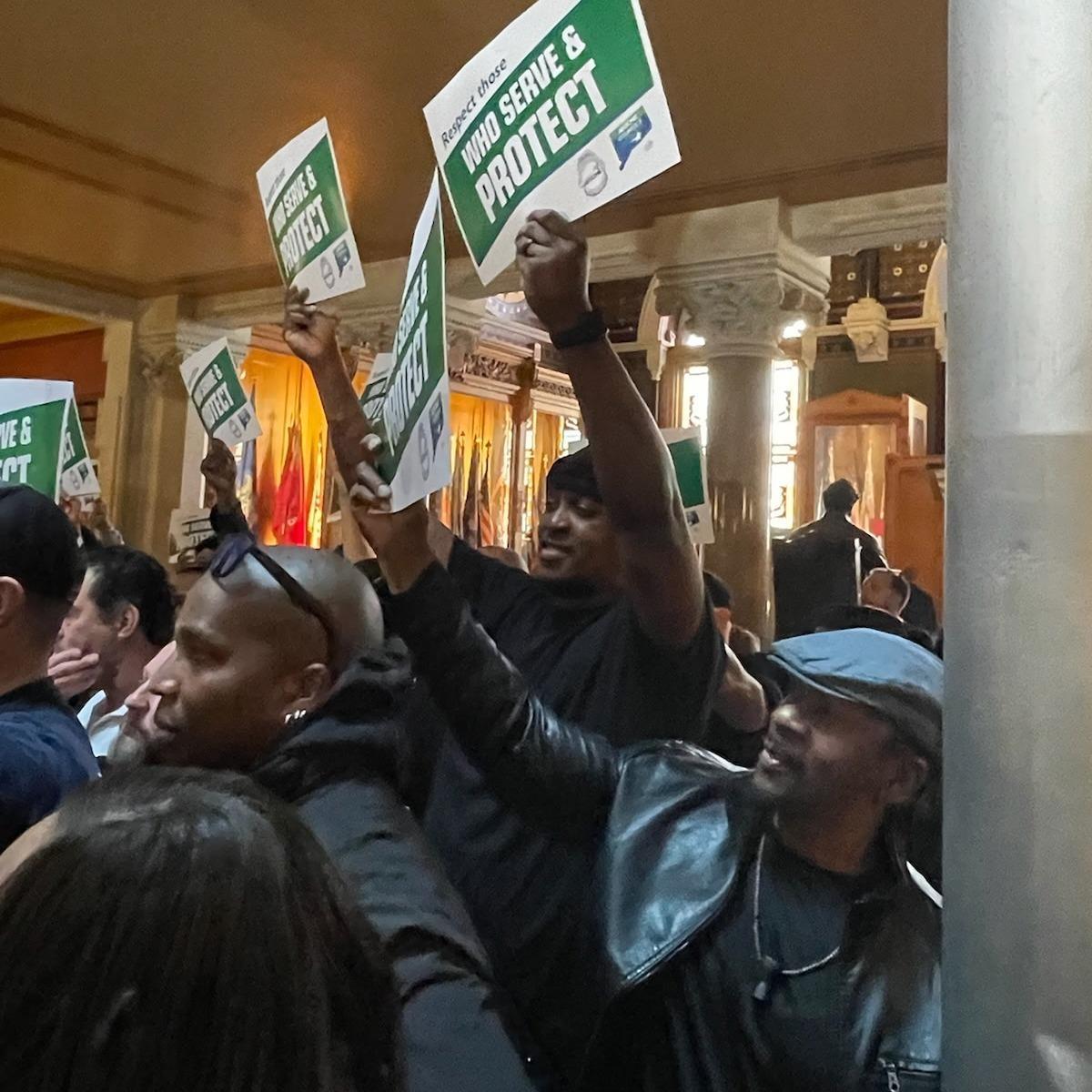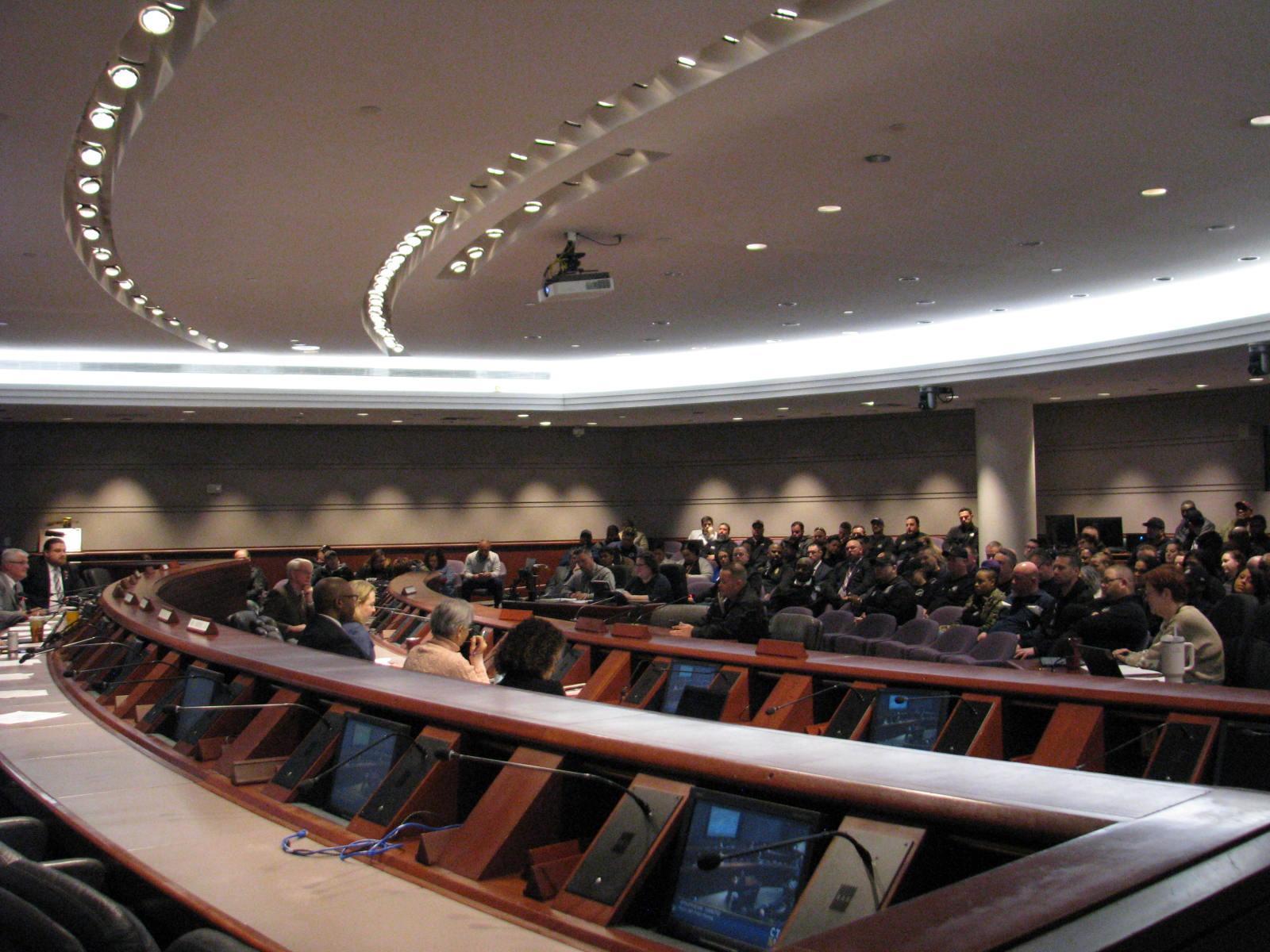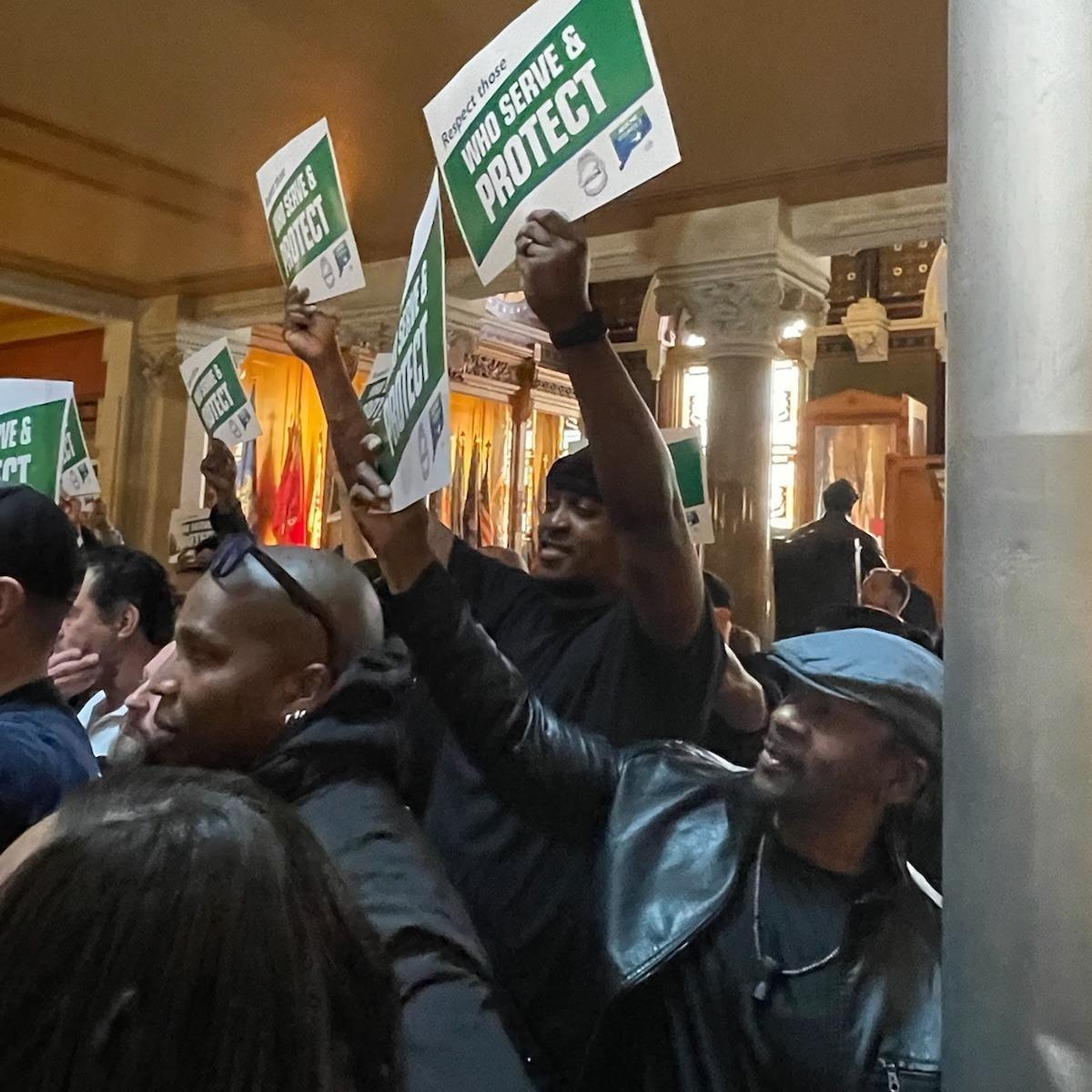On Friday, March 28th, the Joint Appropriations Committee held a public hearing to hear testimony from Connecticut’s citizens on proposed legislation. It was evident from the composition of the audience that the day’s events would be focused upon one particular piece of legislation.
The seats in the gallery were packed with more than 200 grim-faced state employees, some of whom were using their day off or personal leave to come before the legislators on the Appropriations Committee, and all of whom were there to convey one simple message: “enough is enough, keep your hands off of our hard-earned pensions!” The tension in the room was palpable.


The legislation in question, SB-24, was introduced and pushed by Sen. Rob Sampson, Rep. Gale Mastrofrancesco, and Rep. Anne Dauphinais—on behalf of the CBIA, the largest lobbyist group defending the interests of the uber-wealthy and big business at the Capitol. These legislators frequently assail public employee pensions, labor unions, and workers’ rights in general, under the false pretenses of “fiscal responsibility.”
SB-24, if passed, would prohibit overtime payments from being included in the calculation of state employee pensions.
This is a crooked attempt to shirk the state’s responsibility to fund the pensions that have been promised to Connecticut’s dedicated public servants for nearly a century.
AFSMCE Council 4, The Union that represents the correctional officers, ensured that their members’ voices were heard.
Due to the organizing efforts of their union, AFSCME Council 4, these correctional officers made up the majority of state employees at the Appropriations Committee hearing, where they shared firsthand accounts of the harsh realities they face on the job. With strong support from their union, these frontline workers testified about the severe staffing shortages in Connecticut’s prisons—shortages that are driving the unsustainable levels of overtime now under debate.
Correctional work takes a harrowing toll upon the brave individuals who undertake the responsibility of protecting the public from the state’s most violent and dangerous citizens, every day on the job. Public health research on this toll is in a very early stage, but the results that have come to light, thus far, are astonishing. Correctional officers have a life expectancy of just 59 years, a reduction by more than a quarter when compared to the average life expectancy in the United States, which is 79 years. More than a third of the correctional officers included in the study met the conditions for some form of post-traumatic stress illness, and more than 70% of the officers included in the study admitted to using alcohol to help cope with extreme stress. Additionally, the suicide rate amongst correctional officers is approximately 105 deaths per 100,000 officers, more than four times greater than the suicide rate in the U.S. Armed Forces, and more than seven times greater than the national suicide rate (14 deaths per 100,000 persons). Moreover, studies have begun to illustrate that extreme stress and the lack of institutional support for correctional officers drive other unhealthy habits, such as poor dietary and nutritional choices, as well as abnormal sleep patterns, which lead to a rapid deterioration of correctional officers’ physical health and exacerbate existing psychological stressors. It is worth noting that neither of the studies referenced above included correctional officers from Connecticut, but there is absolutely no reason to believe that circumstances and working conditions are any better in Connecticut than elsewhere. These correctional officers put life, limb, as well as mental and emotional well-being, on the line every day in service to the State of Connecticut. They were promised a pension that would provide sufficient support for a well-earned retirement; now, the Republican leadership proposes breaking that promise.
It is also important to note that overtime is mandatory for correctional officers and many other state workers. Privileged legislators and greedy lobbyists have invented the problem of “volunteer overtime” to justify their efforts to further subjugate hard-working, labor-class state employees. For many state employee job classes, the word “volunteer” is misleading at best. When overtime is necessary to meet the staffing requirements at state corrections facilities, officers are given the opportunity to ‘take the bullet’ for their colleagues and accept the overtime assignment, yet, if too few officers step forward, the staffing requirements still must be met. Officers are then ordered to work overtime, under a threat of discipline or termination, which places an extraordinary amount of strain on families and relationships. Every worker in America understands the meaning of “volunteer” and “mandatory,” they understand that being ordered to perform a task under threat of discipline is the exact opposite of “volunteer;” the Republican leadership's—and the moneyed interests that these legislators sidle up to at the expense of their own constituents—attempts to arbitrarily redefine these words borders on absurdity.
The state could easily cut back on overtime spending by hiring the right amount of employees needed to do a job, in the first place. If the legislators responsible for this bill had any genuine interest in “fiscal responsibility,” they would want to make sure that the state government was staffed appropriately.
Instead, the state chooses to pinch pennies by intentionally understaffing its departments and agencies, while counting on management to force hard-working state employees to work even longer hours with even less support.
Finally, it is important to understand that state employees pay into the state pension plan, much like workers pay into Social Security. The contribution rate for state employees varies based on the nature of their job and their date of hire. However, under Tier 4 of the State Employee Retirement System, most state employees contribute 6% of their yearly income to the pension fund, unless these employees perform a hazardous function for the State of Connecticut—such as Corrections Officers—in which case these employees are required to make a supplemental hazardous duty contribution of an additional 3% of their yearly income, bringing these state employees’ contributions to a total of 9% of their annual pay. These employees are required to make these contributions from every component of their annual pay, which includes overtime income, not just a hypothetical “base salary.”
Due to chronic understaffing, it is typical for many correctional officers to be forced to work 20-30 hours of overtime in a biweekly pay period. For many officers, overtime income represents a quarter, a third, or an even larger segment of their paycheck. With SB-24, a large portion of these correctional officers' income would be excised from their pensions, effectively pauperising them and other workers in their old age. Moreover, with SB-24, there is no plan for the state to offer restitution or reimbursement of all pension contributions made from overtime pay, which is the only appropriate course of action if the state chooses to break its promise to provide these workers with their rightful pension, based upon their true income. Senior citizens, retirees, and workers across the United States know the pain of having contributed to Social Security all of their life, only to discover that the federal government could break its promise of a dignified retirement at any time, by simply slashing the program—now the State of Connecticut wants to commit the same injustice, here, with the State Employee Retirement System.
There are two reasons that the robber barons at the CBIA are waging this war on state employees’ union-negotiated pensions.
First, Connecticut's uber-wealthy understand that any money that the state saves by undercutting workers' retirement will find its way back into the already-bursting wallets of big business, either through tax breaks or corporate welfare.
Second, public sector pensions keep the discussion alive. Private corporations have spent the last several decades effectively stealing their workers’ pensions, but so long as public sector pensions exist, the rich and powerful cannot kill the idea of a pension. Unions—such as IAM representing Boeing workers—can, and do, still fight and strike in an effort to restore private sector pensions. There is nothing that big business wants more than to see the pension idea dead and gone—SB-24 is just the CBIA's attempt to put the next nail in the coffin.
The paleo-conservative legislators who began this latest attack on state employee pensions often like to tout their policy positions as “fiscally responsible” and “tough on crime.” These legislators need to understand that they cannot be “fiscally responsible” if their refusal to properly fund state services leads to inefficiencies and ballooning costs. More importantly, these legislators need to know that they cannot be “tough on crime” if all that the heroes who actually do the tough work of enforcing the law and keeping our communities safe can expect from them, is a knife in the back when it comes time to vote.


